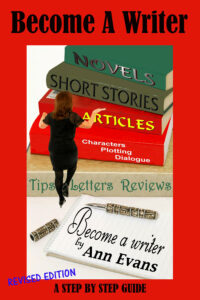Hints And Tips For New Writers #1
27 April 2020
Hello everyone, I’m very happy to have been asked to take over this Hints and Tips for the New Writers slot. I just hope I can follow in Jenny’s shoes and come up with as much good advice as she has done over the last few years.
I remember when I first joined the RNA as a probationer – as we were called back in the 1980s, if I remember correctly. My first attempt at a romantic novel to submit to the RNA was very close to the closing date, so my (then) husband drove me and my manuscript to the committee person’s house to deliver it by hand! No internet or email in those days and it was miles away. I remember feeling so confident about it – positive they would all fall over themselves to help me find a publisher. Lesson number one – prepare to face rejection!
I wrote a further six books – not all romances, there was a thriller and some children’s books. And one by one they were all duly rejected! To say I developed a thick skin was an understatement. The 6th attempt (a romance) almost made the grade and I was invited down to the Mills & Boon offices in London to meet editor Elizabeth Johnson.
I was so overawed at coming face to face with an actual editor, everything she said must have swept straight over my head, because the re-write she suggested resulted in a really nice letter from her saying I’d written the spark out of it. But not to worry, put this one aside and write another. So I did. A Tropical Affair. It came back from a different editor, as in the meantime Elizabeth had moved from contemporary to historical books. Boo hoo!
Skip forward in time, and my 7th book, Cry Danger (a children’s book) got accepted by Scholastic, and that was the start of rejections turning into acceptances. Quite some time later, I took another look at A Tropical Affair. I could immediately see what was wrong with it. I re-wrote and it was accepted by My Weekly as a pocket novel and then published in large print. I’ve well over 30 books published now, children’s, YA, reluctant readers, romance and thrillers. So, what I’d like to offer hints and tips about this month is on those dreaded rejection letters.
After pouring your heart and soul into your story, it is devastating to get it rejected. But oddly enough, rejection letters can be quite useful:
- If you get a rejection letter read it carefully. Undoubtedly, when you glimpse the word unfortunately… that is usually the trigger to switch off and not want to read on. Or we give it a cursory glance before sobbing into our coffee or reaching for the chocolate to comfort ourselves in our misery. So, when you can bear to re-read it, look for any hints as to why it was rejected. Often an editor will say why they’ve rejected it. Take this on board. See if you can learn from it. Importantly, see if there’s an opportunity to amend any specific parts they may mention and re-submit. I’ve done this a number of times. So, look very carefully at those rejection letters and see if you can read between the lines.
- Even if you don’t feel you can re-submit, if an editor has hit on any aspect of the story, e.g. the characters not realistic, a weak plot, etc., work on these aspects so when you send it off to another publisher, your story won’t have these flaws.
- Years ago, one rejection letter I received also had a handwritten message scribbled in the corner saying – watch your spellings and punctuation. I was mortified at the time – but it was certainly another lesson learnt. I had no idea I was making basic typos. Really, I’m eternally grateful to her for pointing that out to me. So, take on board any criticisms or suggestions and learn from them.
- I really would reiterate, learn from your mistakes. In my early writing days, I had a rejection letter saying how the editor liked the story very much and had passed it to the rest of his team. They all liked it. But found the middle section a bit slow. In my naivety I saw it as another rejection and pushed the manuscript away in a drawer. No prizes for what I should have done! Yes, you’ve got it – re-written that middle section making it a whole lot snappier and exciting. Doh! Years later (again) I re-worked the story and got it accepted.
- But what to do if you just get a simple rejection slip or standard, thank you but no thank you email? Well that doesn’t help you at all, and really all you can do is take heart that manuscripts get rejected for many reasons. It doesn’t mean your writing is not good. Possibly they’ve published something similar; or it’s not quite what they are looking for; or perhaps the level of passion is wrong i.e. too steamy or not steamy enough. (I’ve experienced both comments in two different m/s. I adjusted both to suit and got them both accepted.) With a thriller, one editor rejected it because it was too violent, another editor said it wasn’t graphic enough! So, remember, when an editor rejects your work, it’s just their opinion. It doesn’t mean your writing isn’t good, nor does it mean the next editor won’t accept it.
Take heart in knowing that practically every author has had rejections. Some very famous writers have had loads – and still gone on to be hugely successful.
K. Rowling
Best-selling author J. K. Rowling has sold over 450 million books and is worth more than $1 billion. But she sent her finished manuscript to 12 different publishers and was rejected by all of them. It was finally taken by Bloomsbury with a £1,500 advance. Harry Potter went on to sell a record breaking 450 million copies world-wide.
Stephen King
Stephen King rejected his own story, ‘Carrie’, throwing the manuscript into the waste bin in frustration. His wife fished it out and persuaded him to finish it. It was rejected 30 times before Doubleday accepted it. It went on to sell over a million copies and become a successful film. He has since published over 54 novels, 200 short stories, many films and gained many awards.
Agatha Christie
After many rejections, Agatha Christie’s first novel was never published, her second book was also rejected many times until she agreed to change the end. She went on to write 72 novels, 15 story collections plus film and TV adaptations.
And to finish off, it’s a good job Louisa May Alcott paid no attention to one rejection letter for her book, Little Women. The publisher said: “Stick to your teaching, Miss Alcott. You can’t write.”
So, when you get a rejection letter, don’t be too downhearted. Simply read and re-read it, learn from it and acknowledge that it’s all part and parcel of being a writer. Welcome to the club in other words!
Happy writing everyone and stay safe.
Ann
x

Ann Evans writes romance under the name of Ann Carroll, she also writes thrillers, books for children, YA and reluctant readers. She is also a freelance feature writer for various magazines.
Website: www.annevansbooks.co.uk
Facebook: https://www.facebook.com/annevansbooks/
Twitter: https://twitter.com/annevansauthor

Find more writing tips here: Become a Writer – A Step by Step Guide.




